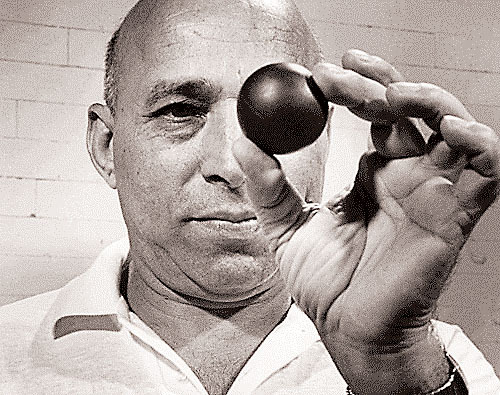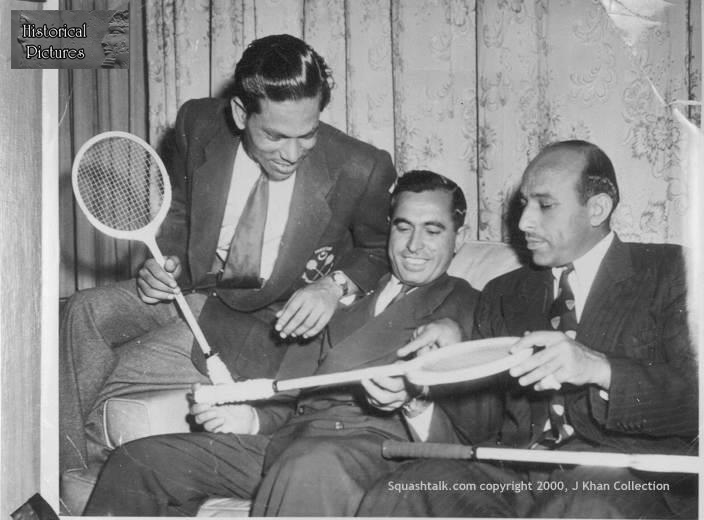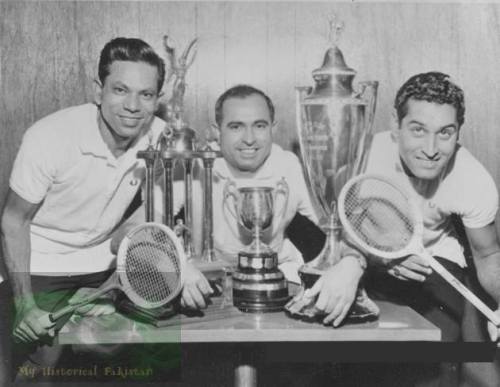The small village of Nawakille (pop. few thousand) outside the frontier city of Peshawar in Pakistan boasts something that no other in the world can. Over the last half century, the village that does not have a single squash court, has produced six world number ones in the sport. In fact, since 1950 the six between them have won 29 British Opens (the Wimbledon of squash) and 14 World Opens (which started only in 1975).
This is an incredible story that just happens to be a sport story. If the sport of squash had a bigger profile in world sport, there would have been movies made on this subject. For now, a writeup in this blog will have to suffice. While the British whiled away their time guarding the Khyber pass, they decided to relieve their boredom by building a few outdoors roofless squash courts. In the heat and direct sunlight, it was difficult to play a game with one of the highest cardiovascular work rates. But try telling that to the Pathan warriors.
 Hashim Khan, the first of the lot, become a ball-boy at the Peshawar British Army Officers club and practiced with the broken balls tossed out by the officers. When the officers would retreat indoors in the 100 degrees heat and the squash court was empty, it would be “Hashim vs Hashim” in the court according to his biography. He got good enough to be the Pakistan champion by 1949 and somehow got enough sponsorship to get to the British Open in 1951. He was 34 years old at the time (Borg retired from Tennis at 26). In the warm up tournament he beat the four time British Open champion Mahmoud El Karim conceding just six points. The British press called it a “flash in the pan”, expecting for order to be restored, but Hashim went on to beat Mahmoud in the Open final 9-5, 9-0, 9-0, and then continued to win the tournament six out of the next seven years.
Hashim Khan, the first of the lot, become a ball-boy at the Peshawar British Army Officers club and practiced with the broken balls tossed out by the officers. When the officers would retreat indoors in the 100 degrees heat and the squash court was empty, it would be “Hashim vs Hashim” in the court according to his biography. He got good enough to be the Pakistan champion by 1949 and somehow got enough sponsorship to get to the British Open in 1951. He was 34 years old at the time (Borg retired from Tennis at 26). In the warm up tournament he beat the four time British Open champion Mahmoud El Karim conceding just six points. The British press called it a “flash in the pan”, expecting for order to be restored, but Hashim went on to beat Mahmoud in the Open final 9-5, 9-0, 9-0, and then continued to win the tournament six out of the next seven years.
Roshan Khan was a cousin of Hashim and beat him in the 1957 British Open.
Azam Khan was Hashim’s younger brother and practice partner. Sparring with his brother, Azam got good enough to win the British Open 4 times. One of his victories was over Roshan Khan with a dominating 9-1, 9-0, 9-0 scoreline that forced the Squash Rackets Association to introduce a playoff for third place to make it worthwhile for the audience to buy tickets.
Mohibullah Khan was the fourth of the group from Nawakille and won the British Open in 1963 in dramatic fashion, recovering from 8-1 down in the fourth game and saving multiple match points before winning in the fifth.
Then came a fallow period of two decades where Pakistan produced five world number 2’s but no world number won as Jonah Barrington of Great Britain and Geoff Hunt of Australia dominated the game. Maybe it was because Aftab Javed, Gogi Alauddin, Mohammed Yasin and Qamar Zaman were not from Nawakille. But Mohibullah Jr was from the village (Jansher’s elder brother), and he was the closest of all to get to world number 1, but unfortunately got incarcerated for carrying drugs to Britain. That will ruin anyone’s career.
The domination started again in 1979 by perhaps the greatest of all, Jahangir Khan (literally “world conqueror”). He beat the legendary Australian Geoff Hunt in the British Open Final and started surely the longest unbeaten streak in any individual sport. He went 5 years and 8 months or 555 matches without getting beat. Over his career, Jahangir accumulated 10 British Open titles and 6 World Opens.
The last of the line was Jansher Khan who won 8 World Opens and 6 British Opens. The Jahangir-Jansher rivalry over the next few years took on the nature of Sampras-Agassi or Palmer-Nicklaus, elevating the sport to a new level but leaving each wondering how much more successful he would have been without the other. Their rivalry was announced to the world in the 1988 World Open in Amsterdam by “the rally”. The first point of the match consisted of 247 strokes and lasted 6 minutes 16 seconds and ended in a let. Jahangir went on to win what would be his last World Open.
No one has ever been able to uncover the secret of Nawakille. Why did a small village produce so many world beaters without the existence of a single squash court. It is easy to come up with explanations of why Kenyans are excellent long distance runners, why Austrians produce world class skiers. But squash and Nawakille? I’m stumped.





















































Aamir Atlas Khan, a nephew of Jansher, who is currently ranked 14 in the world beat world #1 Gregory Gaultier of France in the 2nd round of Qatar Classic Squash Championship. The score 11-6, 7-11, 12-10, 11-9.
This is perhaps Pakistan’s greatest triumph since Jansher left the scene back in the 90s, and bodes incredibly well for the future. Aamir is just 19 years old.
I was a big fan of the Khans while I was growing up in Karachi; and even today, several decades later, I am nostalgically delighted to see their success.
The answer to the question as to why Nawakille has had the distinction of producing a dynasty of world class squash players lies in my opinion in two words “desire” and “perseverance”.
There has been an adage floating around for some time “nothing is impossible if you want it bad enough”. Each of these champions had the desire to become something and like the bumble bee, “nobody told them that they couldn’t”.
I refer to the scientific fact that technically a bumble bee cannot fly. In their case there were no negative people to
“put them down” or if there were, the Khans were oblivious to them.
Obviously Hashim, the leader of the dynasty, practiced untold hours adhering to the adage ” practice makes perfect”. I’m sure that other family members were encouraged both by him and his success. They too had to “walk the walk” which they obviously did very well.